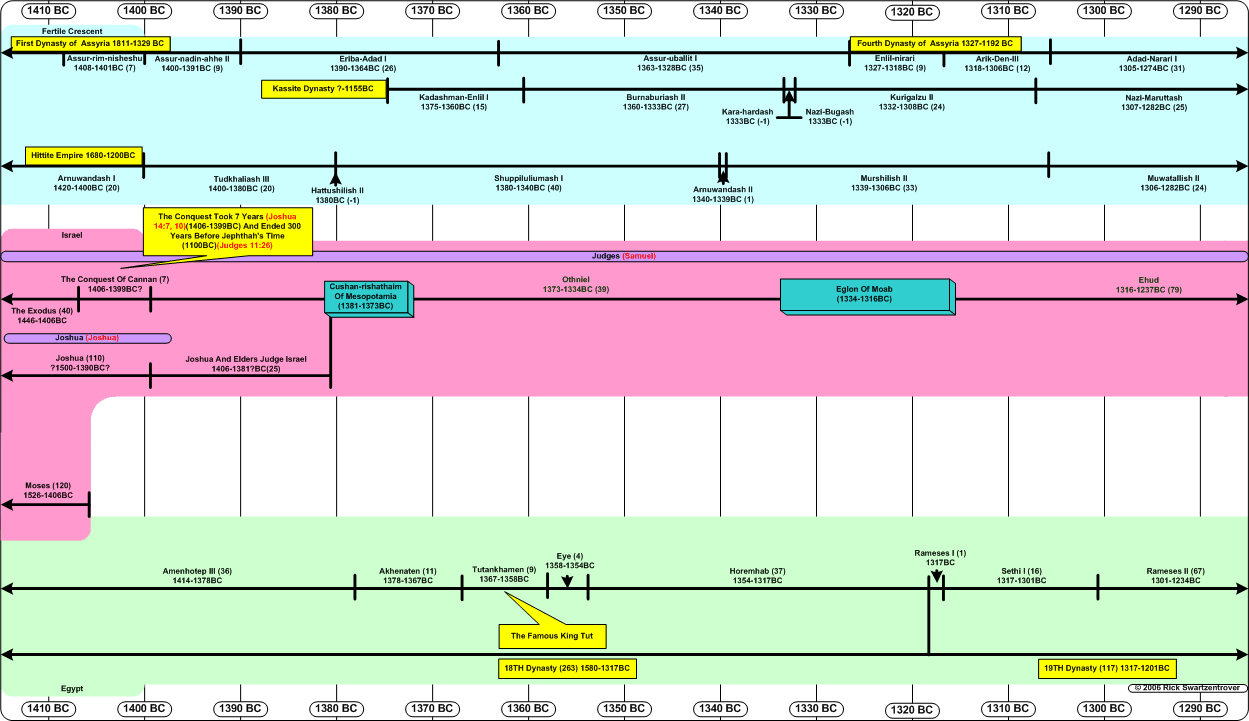
◄1510 - 1390 BC | Timeline 1410-1290 BC (The Judges Part 1) | 1290 BC - 1170 BC►

|
|
|||||
|
Notes on the Nations |
Books of the Bible |
Notes on Israel |
|
| First Dynasty of Assyria 1811-1329 BC Assur-rim-nisheshu 1408-1401BC (7) Assur-nadin-ahhe II 1400-1391BC (9) Eriba-Adad I 1390-1364BC (26) Assur-uballit I 1363-1328BC (35) Fourth Dynasty of Assyria 1327-1192 BC Enlil-nirari 1327-1318BC (9) Arik-Den-IlI 1318-1306BC (12) Adad-Narari I 1305-1274BC (31) |
Links
|
||
|
Hittite Empire 1680-1200BC Kassite Dynasty ?-1155BC Kadashman-Enlil I 1375-1360BC (15) Burnaburiash II 1360-1333BC (27) Kara-hardash 1333BC (-1) Nazi-Bugash 1333BC (-1) Kurigalzu II 1332-1308BC (24) Nazi-Maruttash 1307-1282BC (25) Kingdom of Egypt (?-30 BC) Cush-Rishathaim (1381-1373) Moab - Eglon (1334-1331) |
Joshua 1500-1390BC (110 years) |
||
|
Notes on Israel's Involvement With the Nations |
|||
|
Notes on The Exodus Dating the Exodus There are two dating systems for the Exodus.The Liberal date (1250 BC) The first dating system for the Exodus is made up by liberals who don't believe the Bible is the perfect word of God & therefore must have mistakes in it. These anti-bible fools place the date of the Exodus in the reign of Rameses II. Why do they place the Exodus at this time? Because when they do so they can say that the Bible is false historically & archeologically & must be a work of fiction. Remember if the bible is fiction then they can continue to live in their pet sins & still say they are on God's side. The Real or Conservative Date (1446 BC) The Exodus happened in the year 1446 BC give or take a a few years or so. How do we know that this is the right date. We know for the following reasons: 1) I kings 6:1 saysNow it came about in the four hundred and eightieth year after the sons of Israel came out of the land of Egypt, in the fourth year of Solomon's reign over Israel, in the month of Ziv which is the second month, that he began to build the house of the LORD. The Exodus happened in so 1446 BC - 480 years = 966 BC. King Solomon reigned from 970-931 BC, which would place his 4 year as 966 BC. Isn't it funny how math works perfectly when one trusts what the Bible says?2) Judges 11:26 says'While Israel lived in Heshbon and its villages, and in Aroer and its villages, and in all the cities that are on the banks of the Arnon, three hundred years, why did you not recover them within that time? In other words from the end of the Conquest of Canaan to the time of the Judge named Jepthtah an interval of about a 300 year transpired. According to Joshua 14:7 & 10, the Conquest of Canaan took 7 years & would have ended in 1399 (40 years of exodus [1446-1406] - 7 of Conquest = 1399). Jephthah Judged Israel some time around 1087-1081 BC. (1087 BC + 300 years = 1387)3) The Amarna Letters (see below)The Amarna Letters date from the reign of Amenhotep III, to the reign of Ay, spanning a period from c. 1414-1354 BC. In one of the letter a Canaanite king asks Egypt for help against a group of people known as the Hapru (or Hebrews) that were conquering them. The Conquest of Canaan must have taken place between these dates not in 1250 BC. as claimed by the liberals. The real Exodus date of 1446 BC easily falls within these dates.4) Thutmose IV, brother to the son killed by the 10th plagueWe know from the Dream Stele that Thutmose was not the first born of Pharaoh & therefore fits the facts in the Exodus account that the first born of Pharaoh died in the 10th plague Notes on The Egyptian Pharaohs
Notes on the Hittites
|
|||